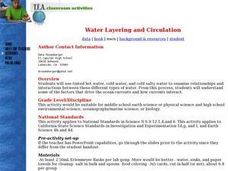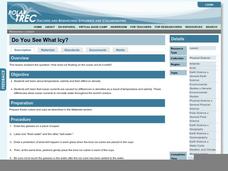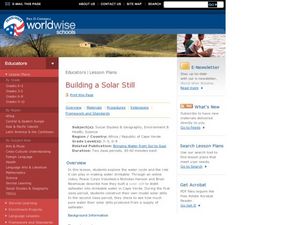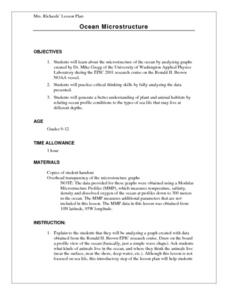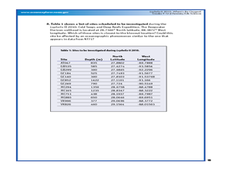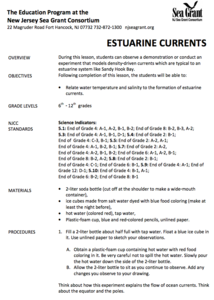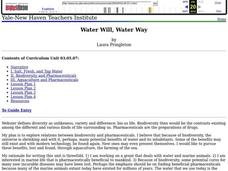Curated OER
What on Earth is That and How Can I Get One?
Students examine how we use submersibles. In this technology based lesson, students examine various technologies used by submersibles in ocean exploration.
Curated OER
Water Layering and Circulation
Young scholars examine relationships and interactions between different types of water. They experiment with colored water of different temperature and salinity and discuss how the results relate to real ocean currents.
Curated OER
Desalination: Creating a Solar Still
To better understand how solar power can aid in creating desalinated drinking water, the class creates a model still. They will build a model of a solar still, make observations, and discuss how the process works. While the idea behind...
Curated OER
Where in the World Is All the Water?
Students investigate the distribution of the earth's water. They conduct a demonstration of water distribution, and create a pie graph to display the results.
Centers for Ocean Sciences
Ocean and Great Lakes Literacy: Principle 1
Is your current lesson plan for salt and freshwater literacy leaving you high and dry? If so, dive into part one of a seven-part series that explores the physical features of Earth's salt and freshwater sources. Junior hydrologists...
Curated OER
Sea Water Freeze
Students observe how salinity affects the time it takes water to freeze. They participate in an experiment to determine that ice is essentially salt-free whether formed from fresh or salt water
Polar Trec
Do You See What Icy?
Here is a lesson that kicks off with a question. "How does ice floating on the ocean act as it melts?" As learners investigate this natural phenomenon, they'll discover that it has a lot to do with temperature, salinity, and the effect...
Curated OER
Building A Solar Still
Students investigate the water cycle by viewing an online video. In this drinking water lesson, students create solar stills at their campus in order to purify water that is tainted. Students view a video on their computers...
Curated OER
Water Quality Monitoring
Students comprehend the four parameters of water quality. They perform tests for salinity, dissolved oxygen, pH and clarity or turbidity. Students comprehend why scientists and environmental managers monitor water uality and aquatic...
Curated OER
Density Stratification and Ocean Circulation
Students examine how circulation currents of the ocean. They use a tub of hot and cold water to demonstrate the currents. They discover how salinity and temperature of water affect its movement.
Curated OER
Water Density
Students identify and analyze the concept of density using the formula, density equals mass divided by volume. They review the differences in salinity levels of the ocean and note that the changes in density are caused by wind and...
Alabama Learning Exchange
The Composition of Seawater
High schoolers explore the concept of finding the composition of seawater. In this finding the composition of seawater instructional activity, students make a saturated salt water solution. High schoolers discuss why there is...
Curated OER
Ocean Microstructure
Students assess the ocean's microstructure by analyzing graphs created during tne Ronald H.Brown research cruise. they discuss at what depths various sea animals live and write paragraphs on data analysis from the graphs.
Curated OER
Saltwater Science
Students conduct an experiment that shows them how salt water allows things to float. In this salt water lesson plan, students mix ingredients together to create salt water and observe how it makes the oceans dense. They then interpret...
Curated OER
Exploring the Aral and Salton Seas
Students investigate the environments of the Aral and Salton Seas. They use images taken from the space shuttle, the U2 spy planes, and remote sensing satellites to learn more about what is happening in each region. Students discuss the...
Curated OER
Hot, Cold, Fresh and Salty
Students observe the effects of layering water and what is more or less saline than normal. In this geoscience lesson students create saline solutions, layer them and observe how the water becomes different temperatures in different layers.
Curated OER
Where's the Oxygen?
Young scholars study seawater and how temperature and salinity influence it. In this oxygen lesson students complete a lab activity on dissolved oxygen.
Curated OER
Coral Bleaching
Students examine the relationship between corals and zooxanthellae, identify stresses to corals, and explain coral bleaching. In this sea life instructional activity students predict the effects of increased temperatures on coral...
Curated OER
Estuarine Currents
Students experiment observing a demonstration on models of density-driven currents which are typically found in an estuarine system of water flow. They compare/contrast water temperature and salinity to the formations of estuarine currents.
Curated OER
Rocky Intertidal Field Trip
Students investigate tides and the land submerged under them. In this intertidal field trip, Students visit the intertidal zone and observe the habitats and animals that live there. Students view the pools under rocks where...
Curated OER
What is an Estuary?
Pupils define the terms estuary and watershed. They conduct an experiment to determine the density differences between fresh and saltwater. They examine the salinity distribution of the Peconic Bay Estuary.
Curated OER
Water Will, Water Way
Students test tap water for hardness and mineral content. For this environmental science lesson, students identify the different stages of the water cycle. They classify plant and animals according to the rules of taxonomy.
Curated OER
The Future of Arctic Sea Ice
Students research about the importance of sea ice to world climate and sea organisms. In this earth science lesson, students create a model of present and future Arctic sea ice communities. They discuss how ice melting affects...
Curated OER
Water Currents
Middle schoolers demonstrate how ocean currents are influenced by changes in density. They discover that temperature and salintiy affect density as well. They participate in a short experiment to end the lesson.

